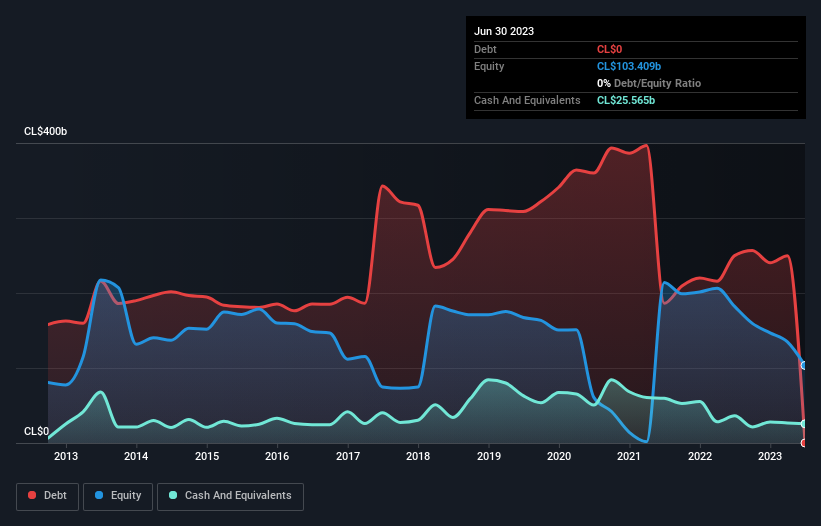- Chile
- /
- Hospitality
- /
- SNSE:ENJOY
Here's Why We're Not At All Concerned With Enjoy's (SNSE:ENJOY) Cash Burn Situation
There's no doubt that money can be made by owning shares of unprofitable businesses. For example, although Amazon.com made losses for many years after listing, if you had bought and held the shares since 1999, you would have made a fortune. But while the successes are well known, investors should not ignore the very many unprofitable companies that simply burn through all their cash and collapse.
Given this risk, we thought we'd take a look at whether Enjoy (SNSE:ENJOY) shareholders should be worried about its cash burn. For the purposes of this article, cash burn is the annual rate at which an unprofitable company spends cash to fund its growth; its negative free cash flow. Let's start with an examination of the business' cash, relative to its cash burn.
Check out our latest analysis for Enjoy
When Might Enjoy Run Out Of Money?
A company's cash runway is calculated by dividing its cash hoard by its cash burn. When Enjoy last reported its balance sheet in June 2023, it had zero debt and cash worth CL$26b. In the last year, its cash burn was CL$4.1b. Therefore, from June 2023 it had 6.2 years of cash runway. Even though this is but one measure of the company's cash burn, the thought of such a long cash runway warms our bellies in a comforting way. The image below shows how its cash balance has been changing over the last few years.

How Well Is Enjoy Growing?
Enjoy managed to reduce its cash burn by 83% over the last twelve months, which suggests it's on the right flight path. Pleasingly, this was achieved with the help of a 30% boost to revenue. It seems to be growing nicely. In reality, this article only makes a short study of the company's growth data. This graph of historic earnings and revenue shows how Enjoy is building its business over time.
Can Enjoy Raise More Cash Easily?
There's no doubt Enjoy seems to be in a fairly good position, when it comes to managing its cash burn, but even if it's only hypothetical, it's always worth asking how easily it could raise more money to fund growth. Issuing new shares, or taking on debt, are the most common ways for a listed company to raise more money for its business. Many companies end up issuing new shares to fund future growth. By looking at a company's cash burn relative to its market capitalisation, we gain insight on how much shareholders would be diluted if the company needed to raise enough cash to cover another year's cash burn.
Enjoy has a market capitalisation of CL$41b and burnt through CL$4.1b last year, which is 10% of the company's market value. As a result, we'd venture that the company could raise more cash for growth without much trouble, albeit at the cost of some dilution.
So, Should We Worry About Enjoy's Cash Burn?
It may already be apparent to you that we're relatively comfortable with the way Enjoy is burning through its cash. For example, we think its cash runway suggests that the company is on a good path. And even though its cash burn relative to its market cap wasn't quite as impressive, it was still a positive. Looking at all the measures in this article, together, we're not worried about its rate of cash burn; the company seems well on top of its medium-term spending needs. Separately, we looked at different risks affecting the company and spotted 3 warning signs for Enjoy (of which 2 are a bit unpleasant!) you should know about.
Of course Enjoy may not be the best stock to buy. So you may wish to see this free collection of companies boasting high return on equity, or this list of stocks that insiders are buying.
Valuation is complex, but we're here to simplify it.
Discover if Enjoy might be undervalued or overvalued with our detailed analysis, featuring fair value estimates, potential risks, dividends, insider trades, and its financial condition.
Access Free AnalysisHave feedback on this article? Concerned about the content? Get in touch with us directly. Alternatively, email editorial-team (at) simplywallst.com.
This article by Simply Wall St is general in nature. We provide commentary based on historical data and analyst forecasts only using an unbiased methodology and our articles are not intended to be financial advice. It does not constitute a recommendation to buy or sell any stock, and does not take account of your objectives, or your financial situation. We aim to bring you long-term focused analysis driven by fundamental data. Note that our analysis may not factor in the latest price-sensitive company announcements or qualitative material. Simply Wall St has no position in any stocks mentioned.
About SNSE:ENJOY
Enjoy
Operates gaming casinos, hotels, discos, restaurants, event halls, and shows in Chile and internationally.
Good value with low risk.
Market Insights
Community Narratives



